|
|
|
Sort Order |
|
|
|
Items / Page
|
|
|
|
|
|
|
| Srl | Item |
| 1 |
ID:
185526
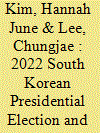

|
|
|
|
|
| Summary/Abstract |
The 2022 South Korean presidential election was the country’s most closely contested election since a democratic direct electoral system was initiated in 1987, with less than a 1 percent difference separating the two major candidates among 34 million votes cast. Despite some parallels with and continuities from previous elections, the 2022 election saw new voting alignments emerge based on one topic: gender equality. In this essay, we explain how and why gender became such a prominent issue during the 2022 election campaign, and how this affected voting patterns, especially among male and female voters in their twenties and thirties. Specifically, we argue that gendered voter behaviour during the election arose from rising anti-feminist sentiments among young men, and that the two main presidential candidates politicized the issue to maximize support from this group. This in turn triggered the consolidation of a young female voting bloc. Using an original survey conducted in January 2022 with an approximate nationally representative sample of 1,017 respondents, we identify two possible causes of rising anti-feminist sentiments among young men: the belief that women receive preferential treatment in employment opportunities and mandatory military service for men. In addition, through an embedded survey experiment run before the election, we proposed that political candidates with pro-gender messages would be less likely to receive support from young men, while candidates with anti-gender messages would be likely to receive more support; these projections were confirmed by the actual voting breakdowns of the recent election. The results suggest that the new administration must handle gender issues with extreme care to ensure that divergent perceptions of the gender divide do not become further polarized over the next few years, since such a development could very well fuel democratic deconsolidation in South Korea.
|
|
|
|
|
|
|
|
|
|
|
|
|
|
|
|
| 2 |
ID:
129558
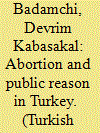

|
|
|
|
|
| Publication |
2014.
|
| Summary/Abstract |
During May and June 2012, the question of abortion was hotly debated in Turkish public forums. This paper analyzes the main characteristics of this abortion debate using John Rawls's conception of public reason as a normative framework. In doing so, speeches and declarations on abortion made by legislators are critically evaluated. The arguments in the debate are examined with a view to interpret how the issue should be discussed as far as the demands of public reason are concerned. From a Rawlsian framework, it is observed that the pro-ban position (Adalet ve Kalk?nma Partisi) is far from contributing to a reasonable balance of political values on abortion whereas the contra-ban position (Cumhuriyet Halk Partisi) satisfies the demands of public reason. Moreover, it is argued that, the latest proposed legislation on abortion cannot be viewed as an outcome of a reasonable balance of political values but is rather an outcome of pragmatic compromise.
|
|
|
|
|
|
|
|
|
|
|
|
|
|
|
|
| 3 |
ID:
174839
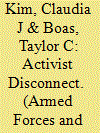

|
|
|
|
|
| Summary/Abstract |
Do activists seeking to challenge the U.S. military presence overseas succeed in persuading the local population? While the comparative literature on base contestation often makes implicit causal claims about public opinion and behavior, these claims have never been tested empirically using individual-level data. Based on an online survey, experiment with residents of communities hosting U.S. military bases in Korea and Japan, we demonstrate a disconnect between anti-base movements and local residents. Local public opinion is most responsive to pragmatic framing of opposition by social movements and tangible information about the consequences of base expansion. Other common activist tactics have little effect and may even backfire. Our findings fill an important gap in the growing literature on the politics of U.S. military bases abroad.
|
|
|
|
|
|
|
|
|
|
|
|
|
|
|
|
| 4 |
ID:
121997


|
|
|
| 5 |
ID:
192087
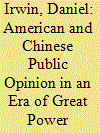

|
|
|
|
|
| Summary/Abstract |
As the US-China great power competition intensifies, public opinion polling may help gauge internal drivers of foreign policy decision-making. Using Pew Research Center data, the authors analyzed how American and Chinese respondents viewed their own and each other’s countries between 2008–2016. They further examined how American attitudes towards China varied by political affiliation between 2008–2019. Both Americans and the Chinese displayed ingroup bias (i.e. rating their own country more positively than the other) and viewed China as a challenger to US hegemony. However, while the Chinese exhibited higher levels of ingroup bias overall, there was no evidence of increasing bias over time. Meanwhile, Americans showed increasing ingroup bias, primarily due to their souring evaluations of China, a tendency that was strongest among Republicans.
|
|
|
|
|
|
|
|
|
|
|
|
|
|
|
|
| 6 |
ID:
142225
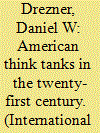

|
|
|
|
|
| Summary/Abstract |
Think tanks have been a part of the United States’ foreign policy establishment for more than a century. They have played a significant role at key junctures in US foreign policy. Two inflection points, however, have dramatically altered the think tank landscape in the last 15 years. The 11 September 2001 terrorist attacks caused these organizations to dramatically expand their staff and overhead, as the demand for their services increased. The 2008 financial crisis subsequently left many of these same think tanks financially overextended. This circumstance forced these organizations to seek out more unconventional funding arrangements, imposing new constraints at the exact moment that their competitive environment intensified. In the twenty-first century, US foreign policy think tanks will maintain their relevancy by moving beyond what made them relevant in the last century.
|
|
|
|
|
|
|
|
|
|
|
|
|
|
|
|
| 7 |
ID:
086662
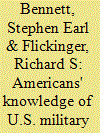

|
|
|
|
|
| Publication |
2009.
|
| Summary/Abstract |
Americans allegedly have an aversion to battle-related military casualties. Their estimates of military deaths may have influenced support for past U.S. military efforts. But what affects accurate estimates of military deaths in wartime? We review the accuracy of estimates for Iraq and three twentieth-century conflicts, finding that the public's estimates were more likely to be on target for Iraq. Then using five polls from the Pew Research Center for the People and the Press, we estimate logistic regression equations in which knowledge of military deaths is regressed on variables typically employed when scholars seek to understand the factors that affect what people know about public affairs. Gender and age always emerge as significant predictors. Education and attention to the news usually matter as well. We also show that estimates of military deaths in Iraq have palpable consequences for opinions about U.S. policies there.
|
|
|
|
|
|
|
|
|
|
|
|
|
|
|
|
| 8 |
ID:
181864
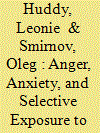

|
|
|
|
|
| Summary/Abstract |
We examine the political consequence of exposure to widely available video content of terror violence. In a two-wave survey of Americans, we assess who is exposed to, and seeks out, terror-related video content in the first wave and then observe who decides to watch raw video footage of the Boston marathon terror attack in the second. We focus centrally on anxiety and anger as differing emotional reactions to the threat of terrorism and document their influence on exposure to terror violence. Anxiety generates avoidance of violent terror content whereas anger increases its consumption. Moreover, we find that anger increases exposure to violent terror content and in addition enhances support for punitive and retaliatory anti-terrorism policy. We discuss the implications of our findings for the broader dynamics of terrorist violence and the emotional basis of selective news exposure.
|
|
|
|
|
|
|
|
|
|
|
|
|
|
|
|
| 9 |
ID:
099889
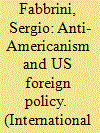

|
|
|
|
|
| Publication |
2010.
|
| Summary/Abstract |
From the end of the Cold War in 1991 to the end of the 2000s, anti-Americanism has passed through different phases in Europe, as well as in other parts of the world: it was modest in the 1990s, it exploded between 2003-2008, then declined after 2008. Although anti-Americanism continues to be rooted in many political cultures and experiences, its emergence in the post Cold War era seemed to be correlated to a United States foreign policy-making process unrestrained by either domestic or international institutions. When domestic and international multilateral checks have been unable to keep under control the exercise of US international power, then anti-Americanism has functioned as a sort of last resort critic on the latter. Anti-Americanism has seemed to be the reaction, more than to controversial foreign policy's decisions, to their unchecked elaboration and unilateral implementation. For world public opinion, the legitimacy of the foreign policy-making process counts more than the latter's outcomes.
|
|
|
|
|
|
|
|
|
|
|
|
|
|
|
|
| 10 |
ID:
122522
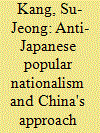

|
|
|
|
|
| Publication |
2013.
|
| Summary/Abstract |
This paper explores the relationship between anti-Japanese popular nationalism and China's approach towards Japan amid Sino-Japanese political tension from 2001 to mid-2006. Among various factors that may affect the relationship, this research focuses on the interaction between the government and the public expressions of anti-Japanese nationalism in China. Throughout most of this period, Sino-Japanese political relations were seriously strained by historical, territorial and other controversial issues, which stirred up anti-Japanese sentiment in China. However, it was only between 2003 and the spring of 2005 that mass anti-Japanese protests were allowed, or at least tolerated, by the Chinese authorities and played a role in Beijing's handling of Japan-related controversies. The paper examines China's domestic political situation during the leadership transition from the third to fourth generation of leaders, which it claims drove the Chinese government's lenient response to popular anti-Japanese protests and enhanced the prospects for popular nationalism to affect the government's approach towards Japan.
|
|
|
|
|
|
|
|
|
|
|
|
|
|
|
|
| 11 |
ID:
176213


|
|
|
|
|
| Summary/Abstract |
Much recent literature has examined the correlates of anti-vaccination beliefs, without specifying the mechanism that creates adherence to these debunked ideas. We posit that anti-vaccination beliefs are an outcome of a general psychological propensity to believe in conspiracies based on new research on the interconnectedness of conspiracy beliefs. These ideas are tested with a confirmatory factor analysis and a seemingly unrelated regression (SUR) model of a nationally representative U.S. sample from the 2016 American National Election Studies. The confirmatory factor analysis shows that anti-vaccination beliefs highly correlate with belief in the unrelated conspiracies that Obama is a Muslim and 9/11 trutherism. Our SUR models also show that all three of these very different beliefs have similar predictors. All three have a negative correlation with political trust, political knowledge, education, and a positive correlation with authoritarianism. Thus, anti-vaccination beliefs are shown to be part of a psychological propensity to believe in conspiracies
|
|
|
|
|
|
|
|
|
|
|
|
|
|
|
|
| 12 |
ID:
135096
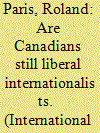

|
|
|
|
|
| Summary/Abstract |
Since coming into office in 2006, the government of Prime Minister Stephen Harper has rejected many of the symbols and practices of the liberal internationalist approach to foreign affairs that Canadian governments of all political stripes broadly embraced during the preceding six decades. As part of this change, the Harper government has also promoted a new narrative about Canada’s history and foreign policy, which encourages Canadians to change how they think about their country and its role in the world. By examining recent opinion surveys, this article asks whether Canadian public attitudes on foreign policy have shifted away from liberal internationalism and toward the Harper government's narrative since 2006.
|
|
|
|
|
|
|
|
|
|
|
|
|
|
|
|
| 13 |
ID:
141169


|
|
|
|
|
| Summary/Abstract |
Despite the importance of public opinion in supporting the military and their missions, little is known about how the UK public perceive their Armed Forces. This article reviews and evaluates available research and opinion poll data of public attitudes toward the UK military and situates the evidence within the civil–military gap literature. Current evidence suggests public regard for the UK Armed Forces is high despite low levels of support for the Iraq and Afghanistan missions. Public understanding of the work of the Armed Forces is limited. Nonetheless, the United Kingdom’s long history of military deployments may have given the public an “intuitive understanding” of the basic realities of the military compared with other European states. There are indications of differences in attitudes between the UK Armed Forces and wider British society, but no firm evidence that the civil–military “gap” has become a “gulf” as claimed by some military leaders.
|
|
|
|
|
|
|
|
|
|
|
|
|
|
|
|
| 14 |
ID:
178205


|
|
|
|
|
| Summary/Abstract |
What are the consequences of women dying in combat? We study how women fighting on the frontlines of the military affects public attitudes toward (1) military conflict and (2) women’s equality. We demonstrate through a series of survey experiments that women dying in combat does not reduce public support for war. However, women’s combat deaths do shape perceptions of women’s equality. Women dying in combat increases support for gender equality, particularly in the public sphere of work and politics, but only among women respondents. The findings indicate that women’s combat deaths do not undermine leaders’ ability to garner support for war, but combat service—and indeed, combat sacrifice—alone is insufficient to yield women’s “first-class citizenship” among the general US public. The results highlight how major policy changes challenging traditional conceptions of gender and war can generate positive attitudinal shifts concentrated among members of the underrepresented community.
|
|
|
|
|
|
|
|
|
|
|
|
|
|
|
|
| 15 |
ID:
126540


|
|
|
|
|
| Publication |
2013.
|
| Summary/Abstract |
This article reports on an audience costs experiment embedded into a survey of the British public (N = 2235). We extend previous research into audience costs in three main directions. First, we provide clear and direct evidence that they exist for a second-order democratic power, the United Kingdom. Second, we show that the extent of audience costs varies, and at times substantially, along with features of the crisis situation that have not been examined empirically in this context before. In particular, the type of crisis strongly influences public reactions both to bluffing in general and to the wisdom or otherwise of escalating crises before backing down. While audience costs do appear to exist for a UK Prime Minister, he or she cannot inflate them by moving up the escalation chain. Rather, a limited use of force tends to mitigate these costs among the British public because it appears to them a more consistent strategy. Third, we show that public disapproval of a failed bluffing strategy is stronger among the more politically engaged, increasing the likelihood that audience costs will be paid at the ballot box.
|
|
|
|
|
|
|
|
|
|
|
|
|
|
|
|
| 16 |
ID:
142226
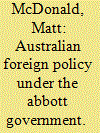

|
|
|
|
|
| Summary/Abstract |
While foreign policy featured prominently on the Australian political agenda in late 2014, the manner of Australia's engagement with the world challenges the idea of a ‘pivot’ from domestic politics to foreign policy. In particular, the government demonstrated a tendency to prioritise domestic political considerations, in particular public opinion, in its dealings with the outside world. This was evident across a range of issue areas: from the ‘internationalist’ agenda of asylum, climate change and aid to more traditional concerns such as bilateral relations with Indonesia and international security. This article explores these dynamics and asks what implications this has for both Australian foreign policy and theoretical accounts of the role and desirability of public engagement with foreign policy in international relations thought.
|
|
|
|
|
|
|
|
|
|
|
|
|
|
|
|
| 17 |
ID:
130443
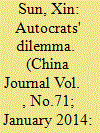

|
|
|
|
|
| Publication |
2014.
|
| Summary/Abstract |
How do authoritarian elections affect voters' attitudes toward the regime and their support for democracy? This article draws upon the case of village elections in China to argue that elections may have two simultaneous effects. First, free and fair elections increase citizens' confidence in the government. Second, elections also allow voters to exercise political rights and accumulate democratic experience through participation, and this in turn may trigger greater demand for further empowerment. Empirical analysis of data from a two-round nationwide survey conducted in 114 villages confirms both effects. One implication of these findings is that competitive elections may simultaneously boost regime popularity and increase public demand for further democratic reform.
|
|
|
|
|
|
|
|
|
|
|
|
|
|
|
|
| 18 |
ID:
152722


|
|
|
|
|
| Summary/Abstract |
How significant is gender in explaining US public opinion regarding civilian casualties inflicted by the US military during combat and counterterror operations? For answers, we test experimental treatment models on original data obtained from pre-election and post-election surveys conducted as part of the 2014 Cooperative Congressional Election Study. Our evidence supports prior claims that women support military action more reluctantly than men, but, much like men, condition their positions on the accompanying human costs. We find, nonetheless, that women are less likely to support attacks that might bring high numbers of civilian deaths, and, unlike men, base their support on the potential gains from an attack. Indeed, we conclude that differences in support for military action between men and women stem more from the perceived benefits of the attacks than from human costs.
|
|
|
|
|
|
|
|
|
|
|
|
|
|
|
|
| 19 |
ID:
192522


|
|
|
|
|
| Summary/Abstract |
Zero-day vulnerabilities are software and hardware flaws that are unknown to computer vendors. As powerful means of carrying out cyber intrusions, such vulnerabilities present a dilemma for governments. Actors that develop or procure such vulnerabilities may retain them for future use; alternatively, agencies possessing such vulnerabilities may disclose the flaws to affected vendors so they can be patched, thereby denying vulnerabilities not only to adversaries but also themselves. Previous research has explored the ethics and implications of this dilemma, but no study has investigated public opinion regarding zero-day exploits. We present results from a survey experiment testing whether conditions identified as important in the literature influence respondents’ support for disclosing or stockpiling zero-day vulnerabilities. Our results show that respondents overwhelmingly support disclosure, a conclusion only weakly affected by the likelihood that an adversary will independently discover the vulnerability. Our findings suggest a gap between public preferences and current U.S. policy.
|
|
|
|
|
|
|
|
|
|
|
|
|
|
|
|
| 20 |
ID:
153710
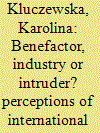

|
|
|
|
|
| Summary/Abstract |
Soon after the breakdown of the Soviet Union in 1991, a civil war started in Tajikistan (1992–97). This was also the period when a number of international organizations arrived in the country to distribute humanitarian assistance and assist in conflict resolution and stabilization. After the UN, the Organization for Security and Co-operation in Europe (OSCE) was the second key organization which appeared in the conflict-stricken country. Like other key international organizations in Tajikistan, the OSCE, which has been in the country since 1994, has seen a shift in its original functions of monitoring and emergency assistance. Some see its avowed objectives in the new century as formalistic, virtual and ineffective. By capturing perceptions of foreign assistance to Tajikistan among employees of the OSCE and other international organizations, NGO workers, government officials and ordinary citizens, this article explores how Tajikistan ‘socialized’ the OSCE, making the organization simultaneously a benefactor, an industry and even an intruder.
|
|
|
|
|
|
|
|
|
|
|
|
|
|
|
|
|
|
|
|
|